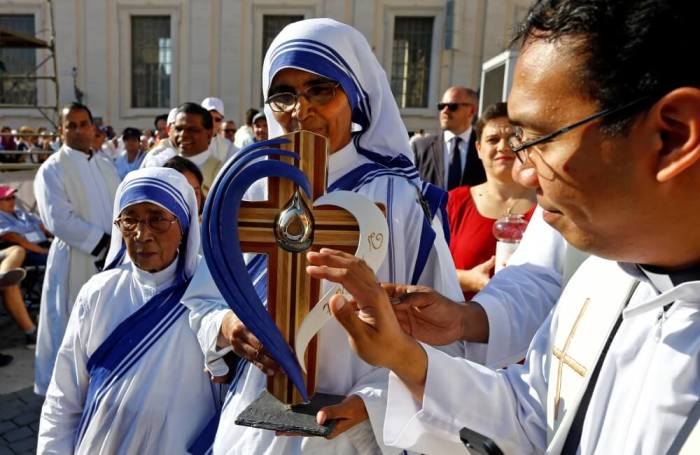India blocks foreign donations to Mother Teresa's Christian charity

India’s federal government has announced it will block foreign donations to a Christian missionary group founded by Mother Teresa amid a rise in attacks on religious minorities in the country.
On Christmas Day, India’s Ministry of Home Affairs said they found “adverse inputs” when reviewing the Missionaries of Charity’s renewal application. As a result, the faith-based nonprofit no longer meets eligibility requirements under the Foreign Contributions Regulation Act.
Founded by the famed Roman Catholic nun in 1950 in Calcutta, the charity runs orphanages, schools for abandoned children as well as soup kitchens and other charitable operations. The organization is dedicated to the “service of the poorest of the poor, irrespective of social class, creed or color.”
“We deliberately choose to show God’s concern for the poorest and the lowliest, remaining right on the ground, while offering immediate and effective service to those in need, until they can find someone who can help them in a better and more lasting way,” the website notes.
The group relied largely on foreign donations to support its humanitarian work, according to The New York Times. Though the Missionaries of Charity can appeal the decision, it is now cut off from vital resources.
Since Prime Minister Narendra Modi came to power in 2014, India’s government has increasingly tightened rules on foreign funding of non-governmental organizations, many of them religious. Christians make up about 2.5% of India’s population, while Hindus comprise nearly 80%, according to the Pew-Templeton Global Religious Futures Project.
Several Indian states have passed what are referred to as “anti-conversion laws,” which ban religious conversion by force or through financial benefits. Activists warn that such laws have intensified attacks and prosecution of Christian individuals and groups.
Earlier this month, police in India’s western state of Gujarat filed a case against the Missionaries of Charity under the Gujarat Freedom of Religion Act of 2003 for allegedly “hurting Hindu religious sentiments” and “luring” young girls “toward Christianity” in a shelter home it runs in Vadodara city.
“The institution has been involved in activities to hurt the religious sentiments of Hindus intentionally and with bitterness,” a report filed to the police alleged.
“The girls inside the Home for Girls are being lured to adopt Christianity by making them wear the cross around their neck and also placing the Bible on the table of the storeroom used by the girls, in order to compel them to read the Bible … It is an attempted crime to force religious conversion upon the girls.”
A spokesperson for the Missionaries of Charity rejected the allegations of forced conversions as unfounded. “We have not converted anyone or forced anyone to marry into Christian faith,” the spokesperson said.
On Monday, Bishop M. Jagjivan, the moderator of the National Christian Council, an organization representing India’s Christian community, told The Wall Street Journal that India’s government has increasingly rejected foreign-funding approvals for Christian groups, forcing many faith-run organizations to shut.
“They are thinking that opposing Christianity is patriotism,” the bishop said. “This is not a healthy atmosphere.”
In 2017, Christian child sponsorship organization Compassion International, which helped 147,000 children in India, was ceased operations in the country after it was blocked from receiving foreign funding. In response, more than 100 members of U.S. Congress wrote a letter to India’s interior minister calling on him to allow Compassion International to receive foreign funds.
Also, in 2017, India cut off Believers Church, a network founded by Gospel for Asia’s K.P. Yohannan, and three other associated groups from receiving foreign funds.
In 2020, the Indian government banned six other Christian groups from receiving foreign funds: New Life Fellowship Association, Evangelical Churches Association of Manipur, Ecreosoculis North Western Gossner Evangelical, and Northern Evangelical Lutheran Church.
India ranks as the 10th-worst country globally when it comes to Christian persecution on Open Doors USA’s 2021 World Watch List. In 2020, the U.S. Commission on International Religious Freedom recommended that India be listed by the U.S. State Department as a “country of particular concern” for the first time since 2004.
“In 2020, religious freedom conditions in India continued their negative trajectory. The government, led by the Bharatiya Janata Party, promoted Hindu nationalist policies resulting in systematic, ongoing, and egregious violations of religious freedom,” the report reads.
USCIRF warned that mobs attacked Christians, destroyed churches and disrupted worship services as they were “fueled by false accusations of forced conversions.”
Last week, a mob of 200 to 300 people stormed a Christian school in Madhya Pradesh while students were taking their exams and threw stones at the building, the school’s principal said.
Earlier in December, the Christian community in India’s northern state of Haryana found a life-size statue of Jesus Christ at the entrance to their historic church desecrated and the lighting inside the premises damaged.
Leah M. Klett is a reporter for The Christian Post. She can be reached at: leah.klett@christianpost.com





























